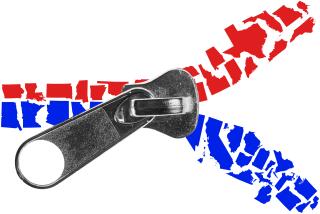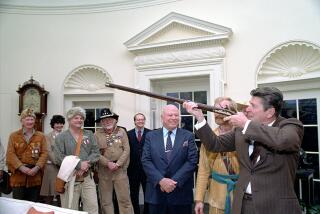Power Moves From Beltway to 50 Capitals
- Share via
The headlines coming out of the National Governors’ Assn. meeting in Washington last weekend suggest that the 50 state executives were rebuffed in their effort to get more money out of the federal government for welfare spending. The Washington Post, for example, bannered: “Under GOP Pressure, Governors Soften Welfare Stance.” One’s first reaction might be to ask: “Whatever happened to Bill Clinton?” But as he tries to wash the coffee stains out of his presidency, the larger lesson will endure: that neither he nor the media nor anybody else can stop the leaching of power away from the nation’s capital to the other 50 capitals.
So even though the governors as a group may lose in their effort to tap the federal treasury--or more precisely, to persuade Uncle Sam to borrow more billions from the future and give it to them today--they still win. Why? Because less decision-making inside the Beltway means more authority outside the Beltway.
Sixty years ago, in his second inaugural address, Franklin D. Roosevelt proclaimed, “I see one-third of a nation ill-housed, ill-clad, ill-nourished.” In the extreme crisis of the Depression, extreme solutions were necessary; FDR’s New Deal represented a radical shift in intergovernmental power relationships. In 1932, state and local spending was nearly double that of federal spending. But by 1940, federal outlays had increased 250%, pulling even with states and localities; then it broke the fiscal equivalent of the sound barrier during World War II and in the decades thereafter.
Throughout this whole epoch, the dominant idea of liberalism was that the unum in our pluribus was best represented not in our common language or culture but in our common government; that we were all federal taxpayers and/or beneficiaries. In such a world view, the states were seen as anachronistic stumbling blocks in the long march toward Keynesian paradise.
The left has traditionally valued cooperation over competition, which it associates with dog-eat-dog social Darwinism. Progressives wanted unions and unity: for workers, for peoples, for nations. Indeed, if one clicks on “cooperation” in Microsoft’s Encarta encyclopedia, the cursor glides past “commune” and “kibbutz” and comes to the Tennessee Valley Authority, the government-run enterprise that New Dealers hoped would prove to be a harbinger of the social democratic future.
During the era of greatest enthusiasm for great government, in the middle of this century, governors were reduced to little more than middlemen, passing along, under various guises, the costs as well as benefits of Washington. FDR had been governor of New York, but he was the last governor in the White House for more than 30 years; from 1945 to 1976, all our presidents earned their reputations in federal service.
Yet the same forces that have spun power out of office towers and mainframe computers are now spinning power out of Washington. Whereas, “complexity” once was seen as an rationale for central planning, it now argues for networked solutions and distributed decision-making. And so the best new thinking about welfare today comes from Wisconsin, where Republican Gov. Tommy Thompson has cut the rolls by some 40% in a decade, or from New Jersey, where the “family cap” on benefits enacted by a former Democratic governor has helped reduce out-of-wedlock-births to mothers on Aid to Families With Dependent Children by 45% in just four years. Meanwhile, the TVA signifies not the wave of the future, but the backwater of the past: a featherbedding, nuclear-power-plant overbuilding, cost-overrunning bureaucracy.
Even 20 years ago, disgust with Washington elected former governor Jimmy Carter. His campaign pledge, “a government as good as its people,” seemed to promise a return to a more Jeffersonian vision of grass-roots governance. Yet when he failed, he was replaced by Ronald Reagan, who was always full-throated in his denunciations of “puzzle palaces along the Potomac.” Then came George Bush, whose single-term presidency confirmed the voters’ judgment that they preferred ex-governors in the White House.
Tonight, as he delivers his fifth State of the Union, Clinton looks out to a nation that is prosperous not because of Washington-mandated cooperation, but because it can compete, at home and abroad. And because he signed last year’s devolutionary welfare reform bill and has done little more than issue pro forma peeps of protests since, Clinton has ratified the idea that the era of big government is truly over, and that the era of diverse state governments has begun again.
More to Read
Get the L.A. Times Politics newsletter
Deeply reported insights into legislation, politics and policy from Sacramento, Washington and beyond. In your inbox twice per week.
You may occasionally receive promotional content from the Los Angeles Times.










